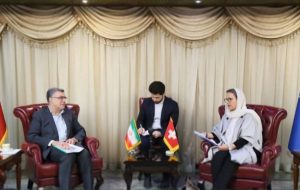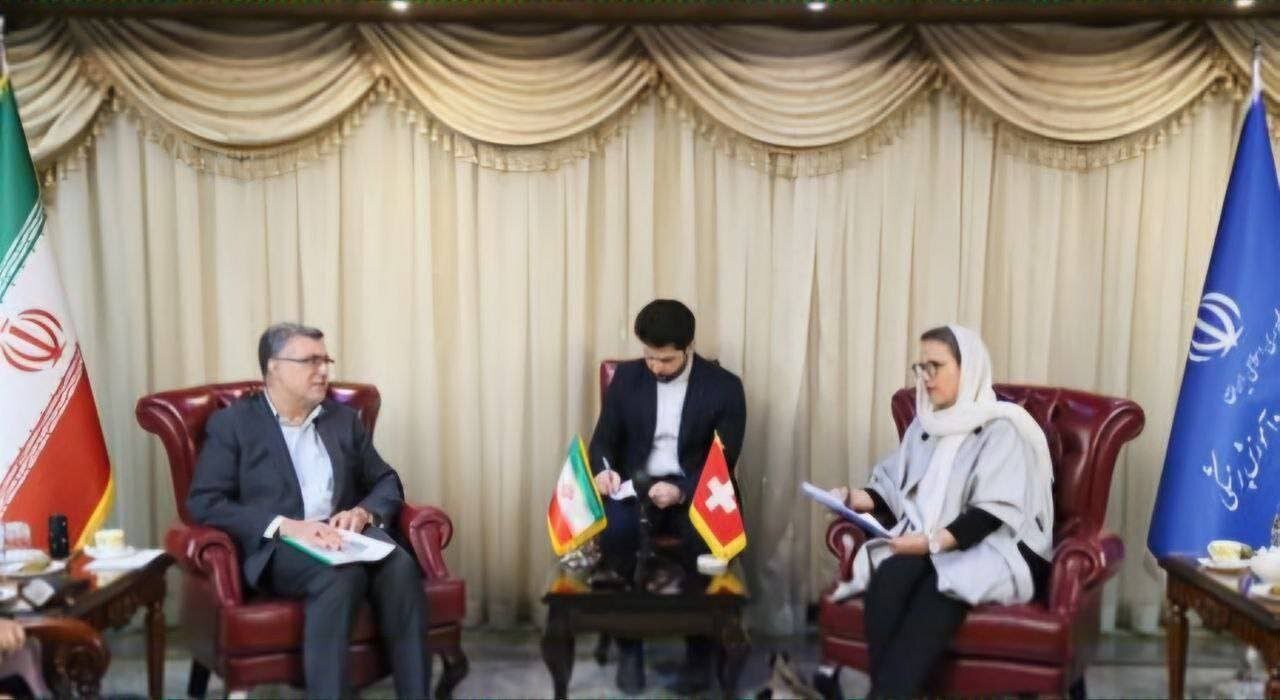Tehran, Bern to further health ties
TEHRAN – Health Minister Mohammad-Reza Zafarqandi and Swiss Ambassador to Tehran Nadine Olivieri Lozano have discussed ways to enhance cooperation in the health sector. In a meeting held on Sunday, Olivieri Lozano highlighted collaborations in the field of health as one of the most important pillars of the relations between the two countries. “Medicines and


TEHRAN – Health Minister Mohammad-Reza Zafarqandi and Swiss Ambassador to Tehran Nadine Olivieri Lozano have discussed ways to enhance cooperation in the health sector.
In a meeting held on Sunday, Olivieri Lozano highlighted collaborations in the field of health as one of the most important pillars of the relations between the two countries.
“Medicines and medical items make up 70 percent of Switzerland’s exports to Iran. Several large and well-known Swiss companies produce medicines and powdered milk in Iran, the health ministry’s website quoted Olivieri Lozano as saying.
The official hoped that the challenges faced by these companies would be addressed soon.
She also lauded Iranians’ achievements in the health sector as well as the accomplishments of universities of medical sciences.
Referring to the recent meeting between the presidents of the two countries on the sidelines of the United Nations General Assembly, Olivieri Lozano stressed the importance of strengthening ties in the health sector.
“We would like to have wider cooperation with the Health Ministry of Iran. Solving the challenges encountered by Swiss companies operating in Iran can facilitate people’s access to high-quality products.”
Zafarqandi, for his part, said Iran and Switzerland can boost cooperation by conducting joint activities in medical sciences and holding scientific conferences and webinars.
Sanctions have greatly hindered financial exchanges, he said, stressing that food and medicine should be excluded from the sanctions, he added.
In case suitable and non-exclusive financial routes are established between the two countries, cooperation in the field of medicine can develop.
“Currently, Swiss pharmaceutical companies in Iran produce valuable products such as medicine and powdered milk, but we expect these companies to be more active in providing medicines,” Zafarqandi added.
He stressed establishing a specialized joint working group to remove obstacles and address problems.
The official proposed hosting a joint meeting in Tehran to discuss technical and executive issues.
Iran’s health sector a role model in the region
In October, the World Health Organization’s (WHO) director for the Eastern Mediterranean Regional Office (EMRO) called Iran’s health sector a role model in the region.
WHO EMRO is interested in expanding cooperation with the Islamic Republic of Iran, IRNA quoted Hanna Hasan Balkhi as saying.
The official made the remarks in a meeting with Alireza Raeisi, the Iranian deputy health minister, and Mohammad-Hossein Niknam, the deputy health minister for international affairs, on the sidelines of the Seventy-first session of the WHO EMRO.
A delegation led by Health Minister Mohammad-Reza Zafarqandi participated in the seventy-first session of the WHO EMRO which was held in Doha, Qatar, from October 14 to 17.
“During my short visit to Iran a few months ago, I became familiar with the capabilities of Iran in the health sector; Iran is a role model in health in the region,” Balkhi noted.
“Utilizing full potentials available in the [regional] countries is essential for us, and we will not hesitate to support the implementation of health programs,” the official noted.
Raeisi, for his part, enumerated priorities in the country’s health sector, namely completing the implementation of the family physician program and the electronic health record program.
Referring to non-communicable diseases as another important issue in the health sector, the official said, “Unfortunately, due to the crises in West Asia, the prevalence of non-communicable diseases has increased, and the onset age of non-communicable diseases such as diabetes and obesity has lowered.
Therefore, we are planning to control the risk factors from childhood through old age. To achieve the goal, we need to develop plans in cooperation with the World Health Organization.”
In May 2023, Ricardo León-Bórquez, the president of the World Federation of Medical Education, praised Iran for progress in the health sector, saying that the country’s achievements are amazing.
“Iran has paid much attention to the importance of medical education and can be one of the key members of the World Federation of Medical Education in the accreditation process,” he added.
He made the remarks in a meeting in Tehran with former Health Minister Bahram Einollahi, noting that the accreditation process of medical education, which was started by WFME in Iran in 2019, has progressed very well and Iran is moving in the right direction in this field.
MT/MG
